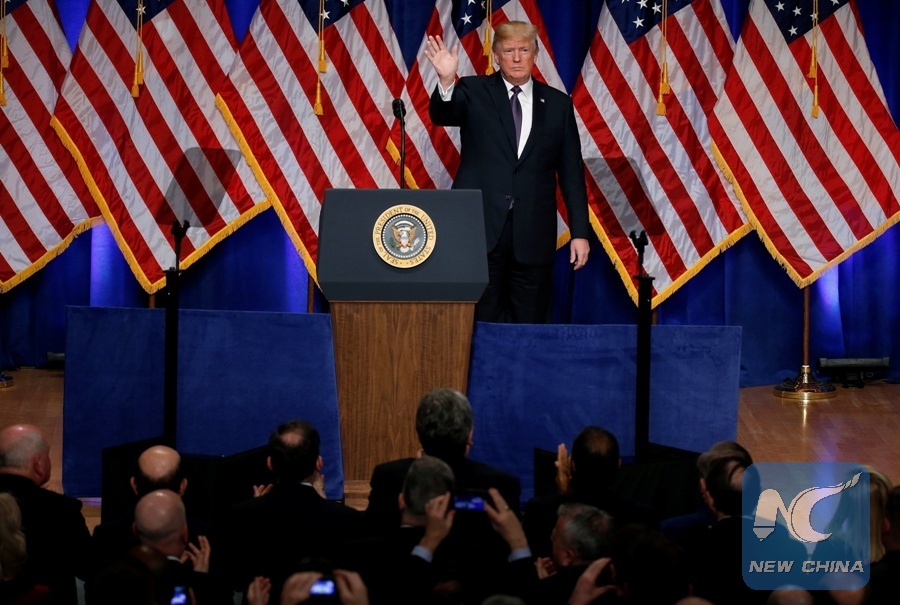
U.S. President Donald Trump waves after delivering remarks regarding the Administration's National Security Strategy at the Ronald Reagan Building and International Trade Center in Washington D.C., U.S. Dec. 18, 2017. (Xinhua/REUTERS)
by Xinhua writers Zhu Dongyang, Liu Chen, Matthew Rusling
WASHINGTON, Dec. 18 (Xinhua) -- U.S. President Donald Trump Monday announced the national security strategy, the first of its kind since he took office in January and the 17th since the former Reagan administration began to submit the report to the Congress in 1987.
The report, published by the executive branch of the government, articulates the worldwide interests, goals, and objectives of the United States important to its security.
A WORLD OF COMPETITION
In a speech delivered in the Ronald Reagan Building and International Trade Center, Trump said the report, developed for over a year, identifies four "pillars" or vital national interests: to protect the homeland and its people, promote U.S. prosperity, preserve peace through strength, and advance U.S. influence.
"This strategy recognizes that, whether we like it or not, we are engaged in a new era of competition. We accept that vigorous military, economic and political contests are playing out all around the world," he said.
U.S. Secretary of State Rex Tillerson later issued a statement, saying the United States "faces a 21st century global environment that presents unconventional threats from non-state actors, as well as challenges to our economic and national security from traditional state actors."
The strategy is based in the context of an ever-competitive world rife with political, economic and military competitions, where White House officials concede Washington "has not been competing as effectively as it might" and needs to do better to protect American interests.
INCLUSION OF ECONOMIC SECURITY
White House officials said the new thing about the report is the inclusion of economic and trade security.
The protection of the U.S. "national security innovation base" has been highlighted. It's a new term introduced to capture the range of activities to secure the U.S. economic interest and beyond.
Michael O'Hanlon, a senior fellow on foreign policy at the research organization Brookings Institution, said the report indicates a sense among some of the top team in the White House that other nations are taking advantage of the United States.
Timothy Heath, a senior research analyst at RAND Corporation, a U.S. think tank, said the new strategy's link to the "America First" principle can be seen in the emphasis on economic competition.
"The United States will likely step up its efforts to modernize the military, reexamine the terms of trade and investment, and increase its diplomatic outreach to countries in Asia and around the world," Heath said.
Dan Mahaffee, senior vice president and director of policy at the Center for the Study of the Presidency and Congress, expected Washington to strengthen a wide range of traditional defense priorities, especially if budgetary concerns could be resolved.
He cautioned that unilateral trade action and other measures are likely in the Trump administration toolbox.
IS CHINA COMPETITOR OR PARTNER?
The report refers to China and Russia as "revisionist powers," listing them as "competitors" seeking to alter the status quo that favors the U.S.
Both are regarded as rival powers that are eroding U.S. security and prosperity, and will eventually overthrow the Washington-defined global order in all aspects.
In the eyes of David Dollar, a senior fellow of Brookings Institution, this marks a change in approach from the previous administration, which valued cooperation with China on the Paris climate accord and the Iran nuclear deal.
"The strategy lays a foundation for protectionist measures against Chinese imports and investment," he said. "But it is only a strategy. It remains to be seen if the United States actually implements harsh protectionist measures."
Heath felt that competition does not have to entail hostility and threat.
"The challenge for both China and the United States will be to manage the competition in a manner that minimizes the risk of conflict," he said. "It will also be essential for the United States to step up cooperation with China to help balance the competitive elements of the bilateral relationship."
According to Mahaffee, the U.S.-China relationship is not one that can fall back on the Cold War concepts of superpower competition and containment.
"Both nations have more complex ties than the Cold War era and many global challenges require Sino-American cooperation for success," he said.

